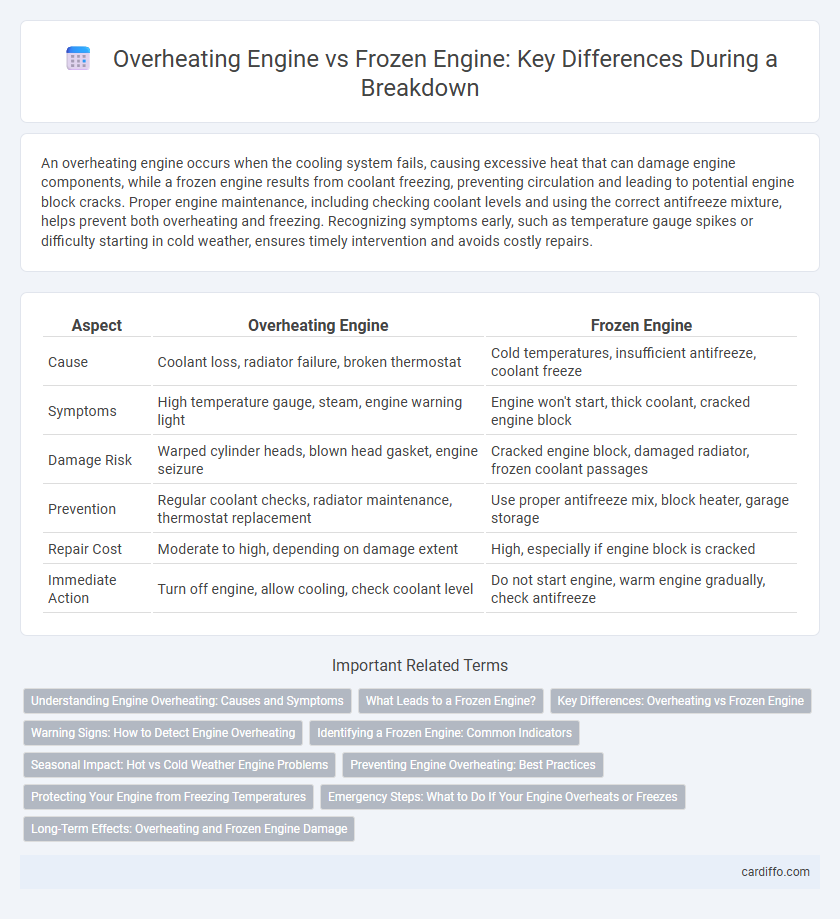An overheating engine occurs when the cooling system fails, causing excessive heat that can damage engine components, while a frozen engine results from coolant freezing, preventing circulation and leading to potential engine block cracks. Proper engine maintenance, including checking coolant levels and using the correct antifreeze mixture, helps prevent both overheating and freezing. Recognizing symptoms early, such as temperature gauge spikes or difficulty starting in cold weather, ensures timely intervention and avoids costly repairs.
Table of Comparison
| Aspect | Overheating Engine | Frozen Engine |
|---|---|---|
| Cause | Coolant loss, radiator failure, broken thermostat | Cold temperatures, insufficient antifreeze, coolant freeze |
| Symptoms | High temperature gauge, steam, engine warning light | Engine won't start, thick coolant, cracked engine block |
| Damage Risk | Warped cylinder heads, blown head gasket, engine seizure | Cracked engine block, damaged radiator, frozen coolant passages |
| Prevention | Regular coolant checks, radiator maintenance, thermostat replacement | Use proper antifreeze mix, block heater, garage storage |
| Repair Cost | Moderate to high, depending on damage extent | High, especially if engine block is cracked |
| Immediate Action | Turn off engine, allow cooling, check coolant level | Do not start engine, warm engine gradually, check antifreeze |
Understanding Engine Overheating: Causes and Symptoms
Engine overheating occurs when the cooling system fails to regulate the engine temperature, often caused by coolant leaks, a malfunctioning thermostat, or radiator issues. Common symptoms include a rising temperature gauge, steam from the radiator, and unusual engine noises. Recognizing these signs early helps prevent severe engine damage and costly repairs.
What Leads to a Frozen Engine?
A frozen engine occurs when the coolant freezes inside the engine block, preventing the engine from turning over and causing potential damage to critical components like pistons and cylinders. This typically happens due to insufficient antifreeze concentration, low coolant levels, or a compromised cooling system that allows water to accumulate and freeze in cold temperatures. Neglecting regular maintenance and failing to address leaks or radiator issues increase the risk of the engine freezing during extreme winter conditions.
Key Differences: Overheating vs Frozen Engine
An overheating engine results from excessive heat buildup due to cooling system failures, causing potential damage like warped cylinder heads and blown gaskets. A frozen engine occurs when engine components seize or lock up, often caused by severe cold weather or lack of lubrication, preventing the engine from turning over. Key differences include overheating involving thermal stress and coolant issues, while frozen engines relate to mechanical seizure and lubrication failure.
Warning Signs: How to Detect Engine Overheating
Engine overheating is often signaled by a rising temperature gauge, steam emitting from the radiator, and an unusual burning smell. Loud knocking noises and reduced engine performance further indicate excessive heat stressing engine components. Monitoring coolant levels regularly helps detect overheating early, preventing severe engine damage.
Identifying a Frozen Engine: Common Indicators
A frozen engine typically shows signs such as an inability to turn over when attempting to start, accompanied by a clicking sound or complete silence. Other indicators include the presence of thick, gel-like coolant under the hood or visible ice buildup around the radiator or engine block. Unlike overheating engines, which commonly exhibit steam, high temperature gauge readings, and coolant leaks, frozen engines often result from severe cold exposure causing engine fluids to solidify.
Seasonal Impact: Hot vs Cold Weather Engine Problems
Overheating engines primarily occur during hot weather when high ambient temperatures increase engine heat and strain the cooling system, often leading to coolant loss and warped components. Frozen engines are common in cold weather, where low temperatures cause engine oil to thicken and coolant to freeze, preventing proper lubrication and circulation. Seasonal variations dictate distinct engine problems, with heat stressing cooling efficiency and cold impairing fluid flow, both risking engine breakdown if not properly managed.
Preventing Engine Overheating: Best Practices
Preventing engine overheating involves regular coolant level checks, using the correct type of antifreeze, and ensuring the radiator and hoses are free from leaks or blockages. Maintaining a clean, functioning radiator fan and replacing worn-out thermostat and water pump components improve engine temperature regulation. Routine inspection of belts and timely oil changes also help prevent overheating by ensuring efficient engine operation and heat dissipation.
Protecting Your Engine from Freezing Temperatures
Protecting your engine from freezing temperatures involves using the correct antifreeze mixture and maintaining it regularly to prevent coolant from freezing and causing damage. A frozen engine can lead to cracked engine blocks and severe mechanical failures, unlike overheating engines, which typically result from cooling system issues or low coolant levels. Ensuring proper insulation and parking in sheltered areas also helps minimize the risk of engine freeze during extreme cold weather conditions.
Emergency Steps: What to Do If Your Engine Overheats or Freezes
If your engine overheats, immediately turn off the air conditioner, switch on the heater to draw heat away from the engine, and safely pull over to allow the engine to cool down. For a frozen engine, avoid trying to start the car to prevent damage; use a block heater to thaw the engine or place warm towels around the engine block. Always check coolant levels and look for leaks during either emergency to prevent further engine damage.
Long-Term Effects: Overheating and Frozen Engine Damage
Overheating engines cause long-term damage such as warped cylinder heads, cracked engine blocks, and degraded gasket seals, leading to costly repairs and reduced engine lifespan. Frozen engines suffer from cracked blocks and damaged pistons due to ice expansion, often necessitating engine replacement or extensive rebuilds. Both conditions result in compromised engine performance and increased maintenance expenses over time.
Overheating engine vs frozen engine Infographic

 cardiffo.com
cardiffo.com